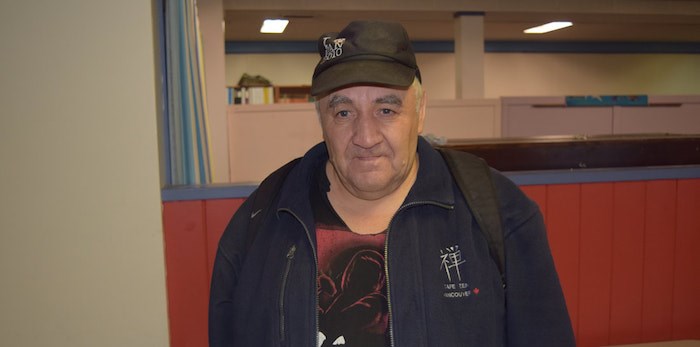The Vancouver Care Project is the work of 17-year-old Rachel Way, who engages with some of Vancouver’s most vulnerable residents facing poverty and homelessness. Each week she shares the story of one person she has met.
The purpose of this project is to share the stories of the lives of those living and working in and around Vancouver’s Downtown Eastside, as well as the homeless and marginalized population of Vancouver. By creating a virtual story book, the goal is to end the stigma that surrounds the area and raise awareness to the struggles the people of the area face.
Leonard: A survivor of the residential schools
 Leonard (Photo by Rachel Way)
Leonard (Photo by Rachel Way)
In school I learned about residential schools--how they tore apart families, damaged cultures and ultimately abused the basic human rights of thousands of aboriginal children. I understood how terrible these schools were and deeply sympathized for the people who had to live through this and were affected by the trauma they caused.
Meeting someone who attended one of these schools, a survivor of the residential schools, gave me a whole new perspective.
I met Leonard at the Holy Trinity soup kitchen in New Westminster. Leonard was an incredibly kind, caring, sweet and happy man who greeted each and every one of the volunteers and thanked them for their time. Most of them already knew him for his gentle character as he was a regular, but I was just getting to know him and soon learned about his incredibly captivating story.
Leonard explained to me that as a retired worker, he lived off a pension that wasn't enough for him to make ends meet. Therefore, he attended the soup kitchen every Thursday for a nice hearty, warm meal.
Leonard shared stories of how he spent 25 years as a hunting guide in the Interior, guiding and hunting with many different people. He was a very interesting man; he told me that he was born in a tent in Dawson's Creek, and that he was a twin but unfortunately his twin passed away.
Leonard, however, comes from a family of 12 children: eight girls and four boys. He joked with me that it was sometimes like living in hell growing up with eight sisters. He then went on to share his heritage; he is Metis and speaks Cree. While discussing his heritage and growing up aboriginal, he began to share with me his experiences in the residential schools.
At first, I was shocked to meet someone who attended one of these schools, but was still interested to learn about his experiences. I could tell right away it was a sensitive topic for him to discuss, but I admired his bravery and willingness to be open about something that was such a terrible time in his life. He explained to me that it was a period of time for him that he liked to "leave in the past."
Leonard was only nine or 10 years old at the time when he was taken away from his family. Everything he had ever known and was stripped of his culture. He shared experiences of attempting to run away with his friends to escape the schools not once, not twice but three times and of course got caught each time.
Leonard told me that they tried to "make him into something that he wasn't," and that they told him that he was not Metis, that he was white and did everything in their power to make him believe so. They attempted to change his beliefs, his heritage, and who he was as a person--an innocent child--imply due to the colour of his skin.
He also explained that life in the schools was very harsh and strict. They slept in long, large rooms all together and woke up very early. They were not allowed to speak their own language, practice their culture, or communicate with anyone outside of the school, including their family. Visitors were seldom allowed at the school and that was the only time they had to see their families. He explained to me that life in the schools was like a dictatorship; you always had to follow the harsh rules that were in place to take away your culture and that made the three years he spent in the school to be like "hell on earth."
No wonder Leonard wanted to leave his experiences in the past.
I was, however, glad to hear that Leonard made an enjoyable life for himself after living in these schools. He shared with me that despite their efforts he did not lose his native tongue and now teaches Cree at UBC in one of their learning exchange programs. It was inspiring to hear that despite the struggles he faced and people's many attempts to strip him of his culture, he stayed strong in his beliefs and roots and even till this day shares his culture with others, to help ensure that it never dies.
Leonard is a true story of inspiration, hope and perseverance that I hope will remind us all to stay true to ourselves and what we believe in and to never give up hope.
This post originally appeared on The Vancouver Care Project and is edited republished here with permission from the author.


